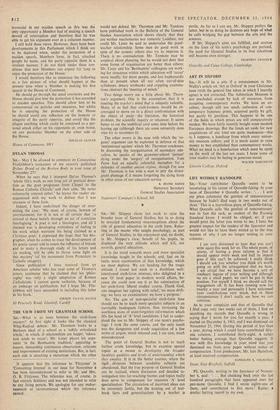SIR,—Mr. Shippey chose last week to raise the broader issue
of General Studies, but in so doing he revealed fundamental misconceptions about the role of general education in the sixth form. Refer- ring to the master who taught psychology, as part of General Studies, to the enjoyment and, no doubt, in Mr. Shippey's view, benefit of his pupils, he displayed the very attitude which will kill, not nourish, general education.
It is the trend towards more and more specialist knowledge taught in the schools, and, fast on its heels, more examination of that knowledge, which we must deplore. We are heading for the tragic attitude I found last week in a doubtless well- intentioned sixth-form mistress, who delighted in a new '0' level paper in modern world affairs, be- cause she could now use it as the culmination of her sixth-form 'liberal studies' course. Thank God, one imagines her sighing with relief, 'no more drift- ing; we have an examination; we have a purpose.'
No. The aim of non-specialist sixth-form time should not be to teach more specialist subjects in an inevitably inadequate fashion, thus increasing the worthless store of soon-forgotten information which fills the head of 'A' level candidates. I fail to under- stand the use to Mr. Shippey of one term's psycho- logy. I took the same course, and the only result was the dangerous and crude acquisition of a few terms of jargon, much misused and, I am sure, much misunderstood.
The point of General Studies is not to teach further crude knowledge, but to examine special topics as a means to developing the broader faculties, qualities and levels of understanding which they employ. It is in the better courses, where the rigid , divisions between academic subjects are abandoned, that the true purpose of General Studies can be realised, where discussion and detailed in- vestigation into far-reaching themes and topics really does serve to compensate for intensive 'A' level specialisation. The circulation of incorrect ideas can be extremely fertile, but the trotting out of text- book facts and generalisations by a teacher is
sterile. As far as I can see, Mr. Shippey prefers the latter, but in so doing he destroys any hope of what he calls bridging the gap between the arts and the sciences.
If Mr. Shippey's aims are fulfilled, and courses on the lines of his term's psychology are pursued, the need for General Studies in its true intentions will become even stronger.
GEOFFREY CROSSICK




























 Previous page
Previous page